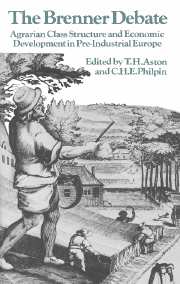Book contents
- Frontmatter
- Contents
- Preface
- Introduction
- 1 Agrarian Class Structure and Economic Development in Pre-Industrial Europe
- 2 Population and Class Relations in Feudal Society
- 3 Agrarian Class Structure and the Development of Capitalism: France and England Compared
- 4 Peasant Organization and Class Conflict in Eastern and Western Germany
- 5 A Reply to Robert Brenner
- 6 Against the Neo-Malthusian Orthodoxy
- 7 A Crisis of Feudalism
- 8 In Search of Agrarian Capitalism
- 9 Agrarian Class Structure and Economic Development in Pre-Industrial Bohemia
- 10 The Agrarian Roots of European Capitalism
- Index
- Past and Present Publications
Preface
Published online by Cambridge University Press: 27 October 2009
- Frontmatter
- Contents
- Preface
- Introduction
- 1 Agrarian Class Structure and Economic Development in Pre-Industrial Europe
- 2 Population and Class Relations in Feudal Society
- 3 Agrarian Class Structure and the Development of Capitalism: France and England Compared
- 4 Peasant Organization and Class Conflict in Eastern and Western Germany
- 5 A Reply to Robert Brenner
- 6 Against the Neo-Malthusian Orthodoxy
- 7 A Crisis of Feudalism
- 8 In Search of Agrarian Capitalism
- 9 Agrarian Class Structure and Economic Development in Pre-Industrial Bohemia
- 10 The Agrarian Roots of European Capitalism
- Index
- Past and Present Publications
Summary
The Brenner debate, as it has come to be called, may justifiably lay claim to being one of the most important historical debates of recent years, and goes back, in one form or another, to at least the time of Marx. In general terms, it bears witness to the continuing interest among historians and scholars in allied fields in the epoch-making theme of the transition from feudalism to capitalism. More specifically, it maintains the tradition of Past and Present in fostering and stimulating discussion and debate on the fundamental issues of the past of which Crisis in Europe, 1560–1660 (published by Routledge and Kegan Paul in 1965) was the first and perhaps the most catalytic. The debate now reprinted from the journal has been long in the making, from Robert Brenner's original article, published in Past and Present in 1976 but stemming from an earlier version given as a paper to the social science seminar of the Institute for Advanced Study, Princeton, in April 1974, until his response published in 1982. Regrettably two of the contributors, Professor Sir Michael Postan and Mr J. P. Cooper, died before the debate was concluded, but their contributions stand as outstanding examples of their own different but equally stimulating approaches to the question. Doubtless they and some of the other authors would now put their points in slightly different form, but it was decided, if only to preserve the structure of the debate, that the essays should be reprinted as they originally appeared in the journal, save only for minor corrections and alterations.
Information
- Type
- Chapter
- Information
- The Brenner DebateAgrarian Class Structure and Economic Development in Pre-industrial Europe, pp. vii - viiiPublisher: Cambridge University PressPrint publication year: 1985
